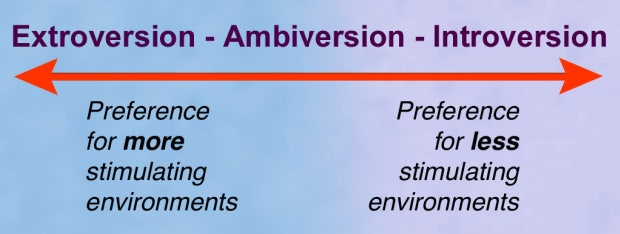6 Signs You're An Ambivert — And What That Means
Introversion and extroversion fall on a spectrum.
 Getty
Getty Many of us have a bit of a misunderstanding about what it means to be an introvert vs. an extrovert, but that's not the only reason you may feel you truly don't fit into either category. If you've never felt like you are an introvert or an extrovert, it could be because you are an ambivert.
What is an ambivert?
An ambivert is someone who falls somewhere in between an introvert and an extrovert. If you are an ambivert, you may feel more introverted or extroverted at various times and in various situations due to a number of factors, such as your mood, the people involved, and other factors that make up the overall content of the circumstances.
What does it really mean to be an introvert vs. an extrovert?
Contrary to popular belief, it's not necessarily true that introverts are shy loners who hate people and extroverts are outgoing party animals who love everyone. Rather, Swiss psychiatrist and psychologist Carl Jung used the terms introversion and extroversion (often spelled extraversion in technical discussions and among psychologists) to explain how people tend to process energy in relation to others.
Introverts need time alone to recharge after social interactions. This frequently causes them to be mistakenly deemed anti-social people haters. But it's not introverts dislike being around others, they simply need downtime afterward to relax and restore their energy.
In contrast, extroverts gain energy when they are surrounded by people and lose energy when they spend too much time alone. They are often considered the life of the party and exhibit outgoing behaviors, but that's not because they like people "more" than introverts do.
Christopher Olivola, an assistant professor at Carnegie Mellon University, found that people hold so firmly to the typical over-simplication of introversion vs. extroversion that they often mistakenly think they can identify someone as an introvert or extrovert by simply looking at their face. But because most studies of personality rely on self-reporting, Olivola explains, "these studies just affirm that people see themselves the same way others see them. All that these studies really tell us ... is 'I've managed to fool you into thinking I'm extroverted, because that's how I like to be seen.'"
The Introvert-Ambivert-Extrovert Spectrum
As is true of all aspects of personality and human nature, being an introvert or extrovert isn't always as simple as either/or. Introversion and extroversion exist on a spectrum ranging from extreme introversion to extreme extroversion, with ambiverts falling somewhere in the middle of the continuum.
 Photo: RCraig09 / CC BY-SA
Photo: RCraig09 / CC BY-SA
If you think you might be an ambivert, ask yourself if many of the following signs of an ambivert personality ring true about who you really are, rather than ringing true about how others say they perceive you.
6 Signs of an Ambivert Personality
1. You like crowds, but you don't like being the center of attention.
Parties are great, but when the spotlight is on you, you kind of shrivel up. Ambiverts are notorious for this.
2. You tolerate small talk, but you love being involved in deep conversations.
Introverts hate small talk; extroverts love it. You're somewhere in the middle. You can put up with it but you'd prefer not to.
3. Your energy level varies according to your current situation.
If you're at a rager of a party, you can rage. If you're in a calm setting, you can be calm. This is a skill neither the introvert or extrovert possesses.
4. It can be difficult for you to assert yourself and your needs at times.
Ambiverts are people pleasers, making it hard for you to assert yourself and what your needs are. You tend to get trampled by others.
5. You have an inherent understanding of both introverts and extroverts.
Introverts are inwardly focused. Extroverts tend to be wildly externally focused. You're a little of both. You pick up on finer details than most do and really, truly understand people. You're something of an empath.
6. People have referred to you as both an introvert and an extrovert.
That's because, as mentioned above, so many people don't realize there's a third option — being an ambivert. So they peg you, probably incorrectly, as being one or the other.
Benefits of Being an Ambivert
There are definite upsides to be an ambivert.
In general, being an ambivert means you are more likely to be a generally flexible, stable and balanced person who gets along with a wide range of personality types and handles themselves well in a wide variety of situations.
Drawbacks of Being an Ambivert
And as is true of most everything, there can be a downside to being an ambivert, too.
Being an ambivert may also mean you are more likely to say yes too easily and to too many things at once, the introverted and extroverted sides of your personality may sometimes come into conflict with each other, and you may have a less predictable nature because so much depends on your mood and the people you're with.
In general, try to not get too caught up in labeling yourself and the various aspects of your personality.
Knowing more about your level of introversion vs. extroversion can provide you better insight into who you are and why you relate to people and situations as you do, but introversion and extroversion are fluid states of being. You will be more or less introverted, extroverted and ambiverted over time, and this is just one of the many, many facets of your personality that make you the uniquely wonderful person you are.
Higher Perspective seeks to bring together like-minded individuals focused on personal growth and expanding their consciousness. We can be better to our planet, better to our brothers and sisters, and better to ourselves. Follow them on Facebook.
